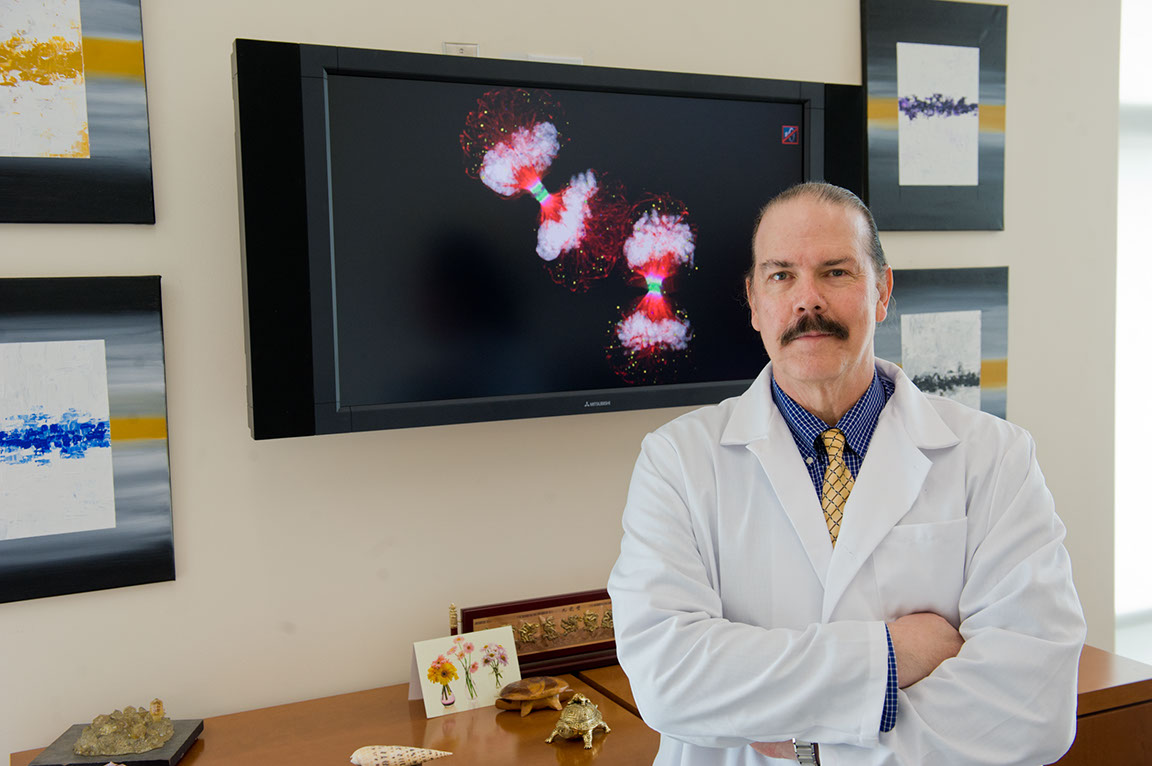Latest News
Research & Innovation
Scientists develop experimental drug that may improve treatments for brain and other metastatic cancers
Feb 22, 2018

A team led by scientists at VCU Massey Cancer Center and VCU Institute of Molecular Medicine (VIMM) may have developed a drug that can overcome some of the most challenging aspects of treating brain cancer—it’s ability to spread into surrounding tissue and develop resistance to radiation therapy.
Glioblastoma multiforme (GBM) is the most common and deadliest form of brain cancer. Currently, the best standard of care involves surgery to remove the tumor followed by radiation therapy to kill remaining cancer cells. Unfortunately, radiation can enhance the aggressiveness and invasiveness of surviving GBM cells. Moreover, any surviving cells have likely developed a resistance to radiation therapy, and if they spread to surrounding brain tissue then doctors are left without effective treatment options.
In a study published in the journal Proceedings of the National Academy of Sciences of the United States of America, researchers led by Paul B. Fisher, M.Ph., Ph.D., were able to extend survival in mouse models of human brain cancer (GBM) by targeting the gene MDA-9/Syntenin with an experimental drug. The drug, known as a PDZ1 inhibitor (PDZ1i) limits protein-protein interaction to reduce the spread of GBM into healthy tissue and overcome resistance to radiation therapy. This work was chosen to be highlighted by the editors of Science, as well as by other journals, as Editor’s Choice, indicating: “The results suggest a possible path to targeted brain cancer therapy.”
MDA-9/Syntenin was originally discovered by Fisher. In prior research, he and his colleagues demonstrated that the gene potentially interacts with more than 150 cancer-related proteins through its PDZ domains, which are chains of amino acids that enable cell signaling by facilitating interactions between proteins.
“PDZ1i is a first-in-class small molecule that works to block the spread of cancer by targeting and inhibiting MDA-9/Syntenin,” says Fisher, who is the Thelma Newmeyer Corman Endowed Chair in Cancer Research and a member of the Cancer Molecular Genetics research program at Massey, chair of VCU School of Medicine’s Department of Human and Molecular Genetics and director of the VCU Institute of Molecular Medicine. “Our approach represents a new paradigm in cancer research, one that focuses on ‘anti-invasion therapy,’ which then shifts to a ‘cytotoxic therapy’ when combined with a second therapeutic approach such as radiation therapy or chemotherapy.”
Originally, the PDZ domain was considered ‘non-druggable,’ but Fisher’s team combined efforts with Maurizio Pellechia’s, Ph.D., research group at the Sanford-Burnham-Prebys Medical Discovery Institute in La Jolla, CA to prove this assumption incorrect. They used an innovative strategy involving fragment-based drug design (FBDD) and nuclear magnetic resonance (NMR) spectroscopy to identify small molecules interacting specifically with the PDZ1 protein domain of MDA-9/Syntenin. This process resulted in the identification of PDZ1i.
PDZ1i dramatically reduced GBM invasion and prolonged survival in Fisher’s human GBM intracranial tumor mouse models. Survival was enhanced even further when combined with radiation therapy. The drug may have broad applications for metastatic cancers. Fisher’s team and other researchers have shown that MDA-9/Syntenin contributes to metastatic activity in melanoma as well as pancreatic, lung, breast, liver and prostate cancers.
“This research provides a path for a new approach to treating cancer metastasis, which is the primary cause of death in patients with advanced solid cancers. Developing a phase 1 clinical trial for PDZ1i should be an achievable objective, but additional work is needed,” says Fisher.
Fisher plans to continue the detailed toxicology and preclinical studies needed in order to develop PDZ1i into a clinically viable drug. He will also continue conducting experiments to better understand the biological mechanisms involved in MDA-9/Syntenin-mediated cancer metastasis.
Fisher collaborated on this research with Timothy P. Kegelman, M.D., Ph.D., Bin Hu, Ph.D., and Sarmistha Talukdar, Ph.D, all from the Department of Human and Molecular Genetics at VCU School of Medicine; Swadesh K. Das, Ph.D., member of the Cancer Molecular Genetics research program at Massey, assistant professor in the Department of Human and Molecular Genetics at VCU School of Medicine and VIMM member; Kristoffer Valerie, Ph.D., member of the Developmental Therapeutics research program at Massey and professor of radiation oncology at VCU School of Medicine; Jason M. Beckta, M.D., Ph.D., from the Department of Radiation Oncology at Massey; Luni Emdad, M.B.B.S., Ph.D., member of the Cancer Molecular Genetics research program at VCU Massey, assistant professor in the VCU Department of Human and Molecular Genetics and VIMM member; Devanand Sarkar, Ph.D., Harrison Research Scholar and member of the Cancer Molecular Genetics research program at VCU Massey, associate professor in the VCU Department of Human and Molecular Genetics and associate scientific director of cancer therapeutics at VIMM; Bainan Wu, Ph.D., Jun Wei, Ph.D., Angela Purves, Ph.D., Surya K. De, Ph.D., and Maurizio Pellecchia, Ph.D., all from Sanford-Burnham-Prebys Medical Discovery Institute; and Frank B. Furnari, Ph.D., and Webster K. Cavenee, Ph.D., both from the Ludwig Institute for Cancer Research at the University of California San Diego.
This study was supported by National Institutes of Health (NIH)/National Cancer Center (NCI) grant R01 CA 168517, the National Foundation for Cancer Research and, in part, by VCU Massey Cancer Center’s NCI Cancer Center Support Grant P30 CA016059.
The full manuscript of this study can be found online at: http://www.pnas.org/content/114/2/370.long
Written by: John Wallace
Related News
Research & Innovation
Novel therapy using engineered immune cells to kill prostate cancer earns $1.8 million Department of Defense grantJan 20, 2026
Research & Innovation
VCU Massey now offers new technology for early detection of lymphedemaDec 8, 2025

Get access to new, innovative care
Treatments in clinical trials may be more effective or have fewer side effects than the treatments that are currently available. With more than 200 studies for multiple types of cancers and cancer prevention, Massey supports a wide array of clinical trials.

Find a provider
Massey supports hundreds of top cancer specialists serving the needs of our patients. Massey’s medical team provides a wealth of expertise in cancer diagnosis, treatment, prevention and symptom management.
